Unit3知识点
人教版九年级英语unit3知识点
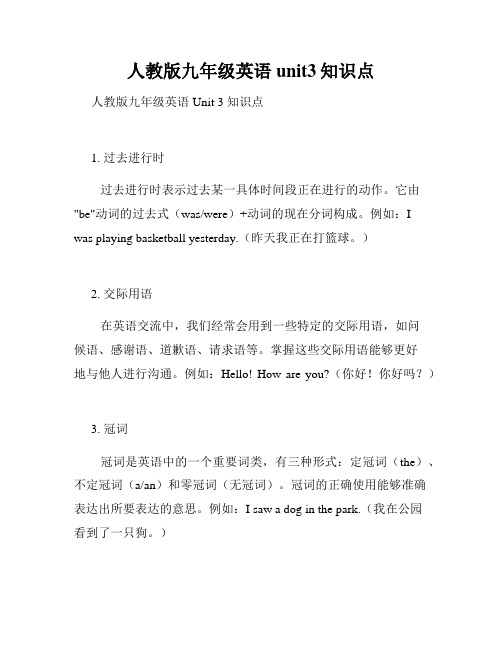
人教版九年级英语unit3知识点人教版九年级英语Unit 3 知识点1. 过去进行时过去进行时表示过去某一具体时间段正在进行的动作。
它由"be"动词的过去式(was/were)+动词的现在分词构成。
例如:I was playing basketball yesterday.(昨天我正在打篮球。
)2. 交际用语在英语交流中,我们经常会用到一些特定的交际用语,如问候语、感谢语、道歉语、请求语等。
掌握这些交际用语能够更好地与他人进行沟通。
例如:Hello! How are you?(你好!你好吗?)3. 冠词冠词是英语中的一个重要词类,有三种形式:定冠词(the)、不定冠词(a/an)和零冠词(无冠词)。
冠词的正确使用能够准确表达出所要表达的意思。
例如:I saw a dog in the park.(我在公园看到了一只狗。
)4. 询问和描述过去经历的表达方式当我们想询问或描述过去的经历时,可以使用一些特定的表达方式。
例如:Have you ever been to Beijing?(你去过北京吗?)Yes, I have been to Beijing before.(是的,我之前去过北京。
)5. 句型转换在英语学习中,我们常常需要进行句型转换,以提高我们的语言运用能力。
例如:I will go to the cinema.(我将去电影院。
)→Will you go to the cinema?(你将去电影院吗?)6. 非谓语动词非谓语动词是一种特殊的动词形式,常见的有不定式、动名词和动词-ing形式。
非谓语动词在句子中可以作主语、宾语、表语或状语等。
例如:Swimming is my favorite sport.(游泳是我最喜欢的运动。
)7. 时态的用法时态是英语中一个重要的语法点,不同的时态可以表示不同的动作发生时间。
如一般现在时表示目前的状态或经常的动作,现在进行时表示正在进行的动作等。
人教版九年级英语Unit-3-知识点总结

Unit 3 知识点总结Unit 3 Could you please tell me where the restrooms are?一、短语总结1. buy some stamps 买一些邮票2. a pair of 一双,一对3. get to the bookstore 到书店4. on one’s right / left 在某人的右边 / 左边5. beside the bank 在银行旁边6. turn right / left 右拐 / 左拐7. between the flower store and the bookstore 在花店和书店之间8. go past the bookstore 经过书店9. be excited to do sth. 对做某事感到兴奋10. try the rides 尝试乘骑项目11. start with ... 以……开始12. need to do sth. 需要做某事13. come on 快点儿14. hold one’s hand抓住某人的手15. at first 首先;最初16. get hungry 饿了17. serve delicious food 提供美味的食物18. on one’s way to ...在某人去……的路上19. pass by 路过;经过20. a rock band 一个摇滚乐队21. walk up to sb. 向某人走去22. come a little earlier 早点儿来23. pardon me 抱歉,对不起;什么,请再说一遍24. mail a letter 寄信25. go east 朝东走26. visit a foreign country 去国外游览27. ask for help politely 礼貌地请求帮助28. sound less polite / impolite 听起来不怎么礼貌 / 不礼貌29. a direct question 一个直接的问题30. in different situations 在不同的情况下31. depend on 取决于32. speak to sb. 和某人说话33. school trip 学校旅行34. such as 诸如35. e-mail address 电子邮箱地址36. lead into a request 导入请求37. spend time (in) doing sth. 花费时间做某事38. trouble sb. 麻烦某人39. communicate better with other people 更好地与他人交流40. an underground parking lot 一个地下停车场41. pass the salt 递一下盐42. change some money 兑换一些钱43. go on a short study vacation 去游学44. an English-speaking country 一个讲英语的国家45. in a rush 急忙地46. on time 按时二、短语用法集合1.not …… until……直到……才……例如:You never know until you try something.2.let’s do sth 咱们做某事吧!3.spend time doing sth 话费时间做某事4.thank sb for doing sth 为做某事而感谢某人5.would like to do sth 想要做某事6.look forward to doing sth 盼望做某事7.It seems (that)…例如:It seems a rock band plays there every evening.8.Could you please tell me... ?例如:Could you please tell me how to get to the post office?9.take的用法① take some food take some medicine (=have吃,喝)② take notes做笔记③ take one’s temperature( 测量)④ It takes sb some time/money to do somet hing (花费,需要)⑤ I’ll take this coat.(=buy购买)⑥ take somebody / something to(带领,拿去,取)⑦ take a train to Chongqing(乘坐)⑧ take off(脱下)10.turn 的用法:① turn to page 80翻到 80 页② It is your turn. 轮到你了。
高中英语必修一Unit-3-Travel-journal知识点

stop doing 停止做某事16. as usual 像平常一样17. so…that 如此… 以至于…So + adj + a/an + n. + thatSuch + a/an +adj. + n. + that18. be familiar with 对…熟识(人作主语)be familiar to 为…所熟识(物作主语)二、学问要点1. Which kind of transport do you prefer to use: bus or train?prefer v.更宠爱;选择某事物(而不选择其他事物)(1)prefer sth.更宠爱……prefer (sb.) to do sth.更宠爱(某人)做……prefer that更宠爱[that从句中常用(should)+动词原形]prefer sth./doing...to sth./doing...与……相比更宠爱……;宁愿……,不愿……e.g. I would prefer meat to fish.我宠爱肉赛过(宠爱)鱼。
I prefer singing to acting. 我宠爱唱歌赛过演戏。
prefer to do...rather than do...宁可……也不……e.g. He prefers to stay at home rather than go shopping.他宁可呆在家里也不情愿去逛商店。
(2)preference n. 偏爱;爱好;宠爱give preference to sb./sth.给……以实惠;优待2. Then she persuade me to buy one.然后她动员我也买了一辆.persuade vt.劝服; 劝服; vi.被劝服persuade sb. (not) to do sth.persuade sb. into / out of doing sth.e.g. I persuaded him to do it. = persuade him into doing it.我已劝服他做这件事。
必修三UNIT3 diverse cultures 单词知识点讲解

and then he went abroad to ____t_ry_h_is_f_o_rt_un_e_____(碰运 气).
创意课堂 点面突破
[小情境写作] (4)我被选中代表我们学校参加英语辩论比赛,因为我精通英语口语。
I’ve_b_ee_n__se_l_ec_t_ed__to__re_p_re_se(rnetpresent) our school to take part in the English debate competition because I have a good command of spoken English.
创意课堂 点面突破
[翻译]得知你已被一所重点大学录取,我写信祝贺你。 Learning that you have been admitted into a key university, I am writing to congratulate you.
4. occur vi. 发生;出现 (occurred; occurring)
[写美]——完成句子 (4)我很幸运能拥有一个足够体贴的妈妈帮助我渡过难关。 I _a_m__f_o_rt_u_n_a_te__to__h_a_v_e_a__th_o_u_g_h_t_f_u_l _e_n_o_u_g_h_m__o_m____ to carry me through the hard times.
10. escape n.逃跑;逃脱;解脱
vi.& vt.逃走;逃脱;避开;被忘掉;被忽视
创意课堂 点面突破
[练通]——单句语法填空 (1)I am specially writing to you to seek ____a_ft_e_r/_fo_r___ your suggestions on building a SpokenEnglish classroom.
九年级英语unit3知识点归纳
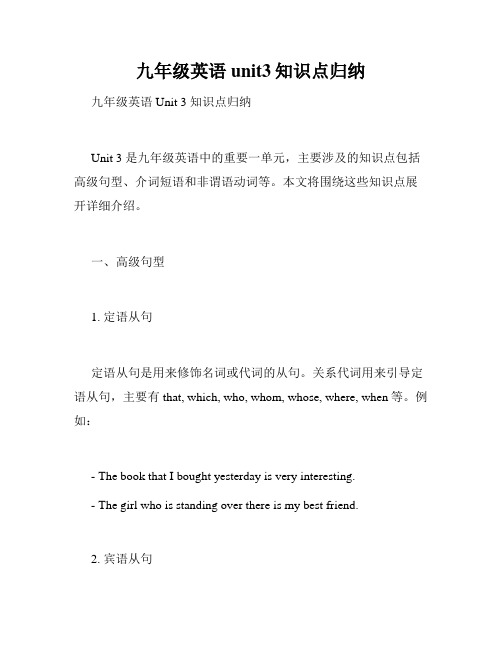
九年级英语unit3知识点归纳九年级英语Unit 3 知识点归纳Unit 3 是九年级英语中的重要一单元,主要涉及的知识点包括高级句型、介词短语和非谓语动词等。
本文将围绕这些知识点展开详细介绍。
一、高级句型1. 定语从句定语从句是用来修饰名词或代词的从句。
关系代词用来引导定语从句,主要有that, which, who, whom, whose, where, when等。
例如:- The book that I bought yesterday is very interesting.- The girl who is standing over there is my best friend.2. 宾语从句宾语从句是在主句中作为宾语的从句。
常用的引导词有that, whether, if等。
例如:- I don't know if it will rain tomorrow.- She asked me whether I had finished my homework.3. 状语从句状语从句是用来修饰主句的副词从句,常用的引导词有when, while, after, before, since, until等。
例如:- He always listens to music while he is doing his homework.- I will call you back as soon as I finish my work.二、介词短语介词短语在句中起着修饰或者指示的作用,可以表达时间、地点、原因、方式等。
常见的介词短语有at, in, on, of, for, with, by等。
例如:- I will meet you at the park tomorrow.- She is good at playing the piano.三、非谓语动词非谓语动词是指在句子中作为非主谓部分的动词形式,包括动词不定式、动名词和现在分词。
Unit 3 知识点详解

1.I’m going to exercise.我将要去锻炼。
exercise锻炼,动词;锻炼,名词exercise=take exercise=take some exercise锻炼2.Are you going to climb a hill?你将要去爬山吗?climb爬,及物动词climb a hill爬山3.You need to exercise and keep fit.你需要去锻炼和保持健康。
need需要,及物动词need to do sth需要去做某事need to exercise需要去锻炼keep保持,系动词fit健康的,形容词keep fit保持健康=keep healthy=stay healthy4.This hill isn’t as high as a real one!这座山没有真的山那么高!high高的,形容词as high as和...一样高(as...as中间加形容词的原形)not as high as不如,没有...高real真正的,形容词a real hill一座真正的山5.Let’s enjoy ourselves!让我们好好享受吧!let’s=let us让我们let让,及物动词let sb do sth让某人做某事Let us play together.让我们一起玩。
enjoy喜欢,享受,及物动词enjoy oneself好好享受,玩得开心enjoy yourself你自己玩得开心enjoy ourselves我们自己玩得开心6.Yesterday I took a boat trip under the famous Harbour Bridge and went past the Sydney Opera House.昨天我在著名的港湾大桥下乘船旅行,经过了悉尼歌剧院。
trip短途旅行,可数名词take a boat trip乘船旅行under在...的下面under the famous Harbour Bridge在港湾大桥下面go past经过=passthe Sydney Opera House悉尼歌剧院go past the Sydney Opera House=pass the Sydney Opera House经过悉尼歌剧院7.I’m having a great time in Australia!我在澳大利亚玩得很开心!have a great time=have a good time=have a nice time=have a wonderful time玩得很开心8.Take care!保重!care照顾,关怀,名词take care保重take care of...照顾...=look after...take good care of...照顾好=look after...welltake good care of yourself=look after yourself well照顾好你自己9.We’re sitting in a little coffee shop by the River Seine.我们正坐在塞纳河旁边的一个小咖啡馆里面。
七年级英语unit3知识点总结
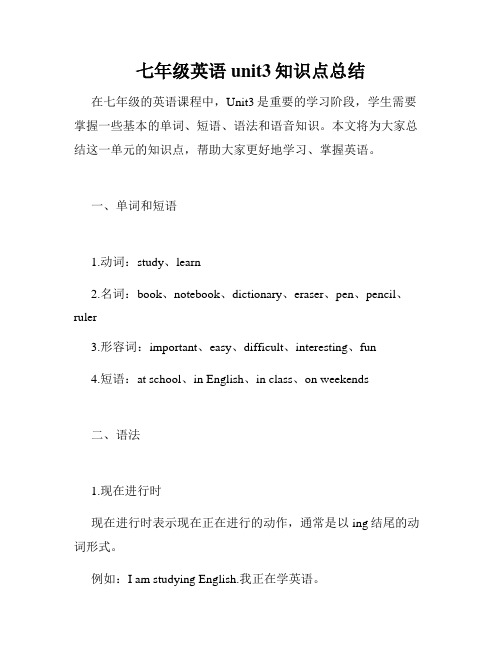
七年级英语unit3知识点总结在七年级的英语课程中,Unit3是重要的学习阶段,学生需要掌握一些基本的单词、短语、语法和语音知识。
本文将为大家总结这一单元的知识点,帮助大家更好地学习、掌握英语。
一、单词和短语1.动词:study、learn2.名词:book、notebook、dictionary、eraser、pen、pencil、ruler3.形容词:important、easy、difficult、interesting、fun4.短语:at school、in English、in class、on weekends二、语法1.现在进行时现在进行时表示现在正在进行的动作,通常是以ing结尾的动词形式。
例如:I am studying English.我正在学英语。
2.一般现在时一般现在时表示经常、习惯性地发生的动作或状态。
例如:I go to school every day.我每天都上学。
3.人称代词人称代词是表示人的身份的代词,用来代替某个人或一组人。
例如:I(我)、you(你)、he(他)、she(她)、it(它)、we(我们)、they(他们)。
三、语音1.长音和短音长音和短音是英语中的两种基本发音方式,必须掌握。
例如:cat(短音)、cake(长音)2.重读音节在英语单词中,有些音节的发音比其他音节更强烈,这种音称为重读音节。
例如:computer(com-PUT-er)以上就是七年级英语Unit3的主要知识点总结,希望本文对大家的英语学习有所帮助。
在学习英语的过程中,要积极听、说、读、写,多练习,做到理论与实践相结合,才能在英语学习中获得更好的成就。
九年级英语Unit3知识点:第三单元

九年级英语Unit3知识点:第三单元学好知识就需要平时的积累。
知识积累越多,掌握越熟练,编辑了九年级英语Unit3知识点:第三单元,欢迎参考! 1. allow sb. to do sth. 允许某人做某事(主动语态)如: Mother allows me to watch TV every night. 妈妈允许我每晚看电视。
be allowed to do sth. 被允许做某事(被动语态)如: LiLy is allowed to go to Qinzhou. 莉莉被允许去钦州。
2. get their ears pierced 穿耳洞 让/使(别人)做某事 get sth. done(过去分词) have sth. done 如: I get my car made. == I have my car made. 我让别人修好我的车 3. enough 足够 形容词+enough 如:beautiful enough 足够漂亮 enough+名词 如:enough food 足够食物 enough to 足够…去做… 如: I have enough money to go to Beijing. 我有足够的钱去北京。
She is old enough to go to school.她够大去读书了。
4. stop doing sth. 停止做某事 Please stop speaking.请停止说话。
stop to do sth. 停止下来去做某事 Please stop to speak. 请停下来说话。
5. 看起来好像…sb. seem to do sth. He seems to feel very sad. it seems that +从句It seems that he feels very sad. 他看起来好像很伤心。
6. 系动词不能独立作谓语,要和表语一起构成谓语。
九年级上册英语u3知识点
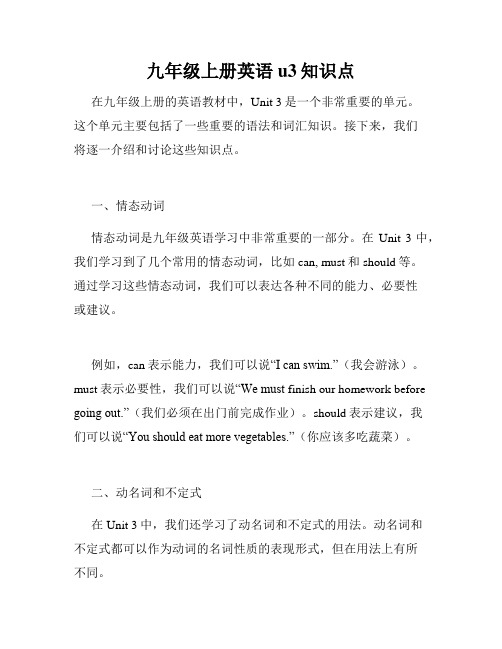
九年级上册英语u3知识点在九年级上册的英语教材中,Unit 3是一个非常重要的单元。
这个单元主要包括了一些重要的语法和词汇知识。
接下来,我们将逐一介绍和讨论这些知识点。
一、情态动词情态动词是九年级英语学习中非常重要的一部分。
在Unit 3中,我们学习到了几个常用的情态动词,比如can, must和should等。
通过学习这些情态动词,我们可以表达各种不同的能力、必要性或建议。
例如,can表示能力,我们可以说“I can swim.”(我会游泳)。
must表示必要性,我们可以说“We must finish our homework before going out.”(我们必须在出门前完成作业)。
should表示建议,我们可以说“You should eat more vegetables.”(你应该多吃蔬菜)。
二、动名词和不定式在Unit 3中,我们还学习了动名词和不定式的用法。
动名词和不定式都可以作为动词的名词性质的表现形式,但在用法上有所不同。
动名词通常以-ing结尾,可以作为主语、宾语或介词的宾语。
例如,“Swimming is my favorite sport.”(游泳是我最喜欢的运动)。
而不定式则以to加动词原形的形式出现,可以作为主语、宾语、表语或宾补。
例如,“To learn a second language is beneficial to our future.”(学习第二语言对我们的未来有益)。
三、虚拟语气在Unit 3的学习中,我们也接触到了虚拟语气的用法。
虚拟语气是英语中的一种特殊语法结构,用于表达与事实相反的假设、愿望或建议。
在虚拟语气的用法中,主要使用了虚拟条件句和虚拟结果句。
例如,“If I were rich, I would travel around the world.”(如果我有钱,我会环游世界)。
四、词汇积累在Unit 3中,我们还积累了大量的词汇。
人教版英语九年级全册Unit3 单元知识点归纳

Unit3 单元知识点归纳一、重点词汇:stamp rush suggest mail convenient politely polite impolite request direction correct speaker二、短语:1. excuse me 劳驾,请原谅,打搅2. get to 到达3. get some magazines 得到一些杂志4. have dinner 吃晚餐5. get some information about 获取有关…….的一些信息6. a pair of 一双,一对,一副7. on one’s / the right 在右边8. turn left / right 向左/ 右拐9. between…..and….. 在…..和…..之间10. go past 经过,路过11. come on 快点儿,过来,加油12. on one’s way to 在某人去…….的路上13. a little earlier 早点儿14. the shopping center 购物中心15. a good place to eat 一个吃饭的好地方16. the corner of …….的角落/ 拐角处17. in different situations 在不同的情况下18. lead in to 导入,引入19. on time 准时,按时20. look forward to 盼望,期待21. pardon me 什么,请再说一遍三、固定短语:1. not…..until…… 直到…..才……2. Let’s do sth. 让我们做某事吧3. start doing sth. 开场做某事4. spend time doing sth. 花费时间做某事5. thank sb. for (doing) sth. 为〔做〕某事而感谢某人6. would like to do sth. 想要做某事7. look forward to doing sth. 盼望,期待做某事四、重点句型:1. Excuse me, could you please tell me how to get to the bookstore?打搅一下,请你告诉我如何去书店好吗?2. Excuse me, do you know where I can get some postcards?请问,你知道在哪里可以买到一些明信片吗?3. I wonder where we should go next.我想知道接下来我们应该去哪儿。
人教版九年级全一册英语Unit3单元语法知识点总结
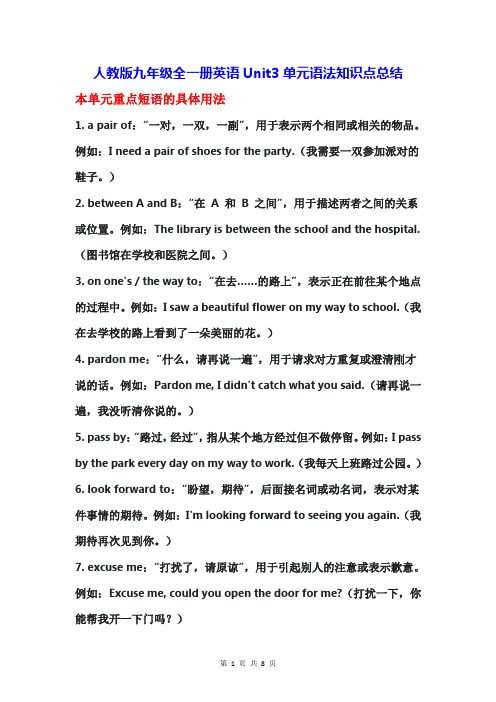
人教版九年级全一册英语Unit3单元语法知识点总结本单元重点短语的具体用法1. a pair of:“一对,一双,一副”,用于表示两个相同或相关的物品。
例如:I need a pair of shoes for the party.(我需要一双参加派对的鞋子。
)2. between A and B:“在A 和B 之间”,用于描述两者之间的关系或位置。
例如:The library is between the school and the hospital.(图书馆在学校和医院之间。
)3. on one's / the way to:“在去……的路上”,表示正在前往某个地点的过程中。
例如:I saw a beautiful flower on my way to school.(我在去学校的路上看到了一朵美丽的花。
)4. pardon me:“什么,请再说一遍”,用于请求对方重复或澄清刚才说的话。
例如:Pardon me, I didn't catch what you said.(请再说一遍,我没听清你说的。
)5. pass by:“路过,经过”,指从某个地方经过但不做停留。
例如:I pass by the park every day on my way to work.(我每天上班路过公园。
)6. look forward to:“盼望,期待”,后面接名词或动名词,表示对某件事情的期待。
例如:I'm looking forward to seeing you again.(我期待再次见到你。
)7. excuse me:“打扰了,请原谅”,用于引起别人的注意或表示歉意。
例如:Excuse me, could you open the door for me?(打扰一下,你能帮我开一下门吗?)8. get some information about:“获取有关……的一些信息”,用于表示获取关于某个主题的信息。
unit3知识点
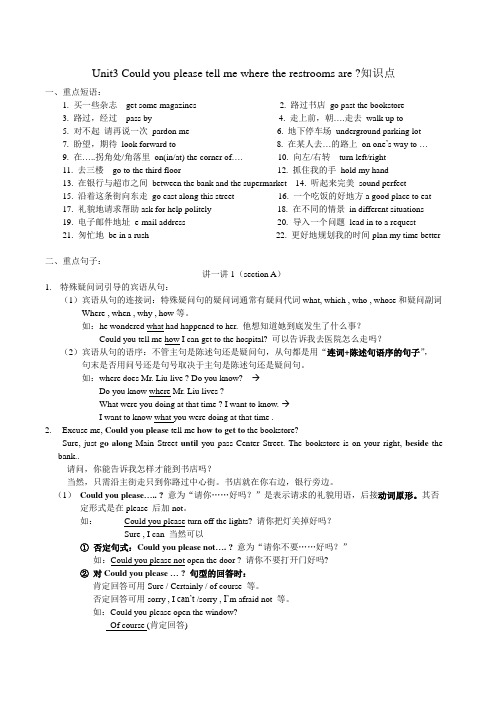
Unit3 Could you please tell me where the restrooms are ?知识点一、重点短语:1. 买一些杂志get some magazines2. 路过书店go past the bookstore3. 路过,经过pass by4. 走上前,朝….走去walk up to5. 对不起请再说一次pardon me6. 地下停车场underground parking lot7. 盼望,期待look forward to 8. 在某人去…的路上on one’s way to …9. 在…..拐角处/角落里on(in/at) the corner of…. 10. 向左/右转turn left/right11. 去三楼go to the third floor 12. 抓住我的手hold my hand13. 在银行与超市之间between the bank and the supermarket 14. 听起来完美sound perfect15. 沿着这条街向东走go east along this street 16. 一个吃饭的好地方a good place to eat17. 礼貌地请求帮助ask for help politely 18. 在不同的情景in different situations19. 电子邮件地址e-mail address 20. 导入一个问题lead in to a request21. 匆忙地be in a rush 22. 更好地规划我的时间plan my time better二、重点句子:讲一讲1(section A)1.特殊疑问词引导的宾语从句:(1)宾语从句的连接词:特殊疑问句的疑问词通常有疑问代词what, which , who , whose和疑问副词Where , when , why , how等。
如:he wondered what had happened to her. 他想知道她到底发生了什么事?Could you tell me how I can get to the hospital? 可以告诉我去医院怎么走吗?(2)宾语从句的语序:不管主句是陈述句还是疑问句,从句都是用“连词+陈述句语序的句子”,句末是否用问号还是句号取决于主句是陈述句还是疑问句。
高一必修三英语unit3知识点
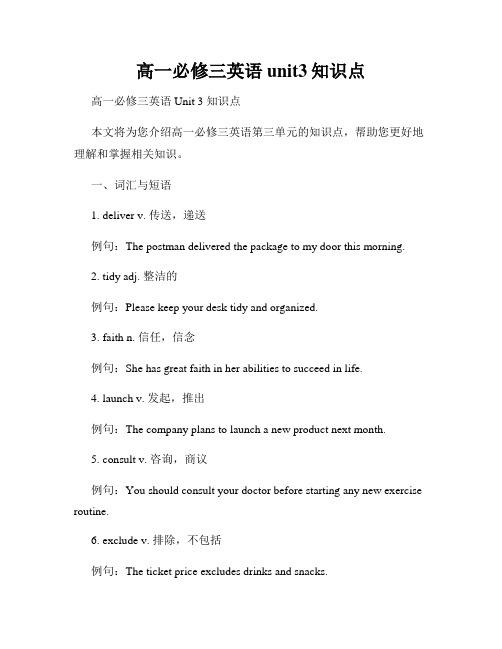
高一必修三英语unit3知识点高一必修三英语Unit 3 知识点本文将为您介绍高一必修三英语第三单元的知识点,帮助您更好地理解和掌握相关知识。
一、词汇与短语1. deliver v. 传送,递送例句:The postman delivered the package to my door this morning.2. tidy adj. 整洁的例句:Please keep your desk tidy and organized.3. faith n. 信任,信念例句:She has great faith in her abilities to succeed in life.4. launch v. 发起,推出例句:The company plans to launch a new product next month.5. consult v. 咨询,商议例句:You should consult your doctor before starting any new exercise routine.6. exclude v. 排除,不包括例句:The ticket price excludes drinks and snacks.7. accompany v. 陪同,伴随例句:I'll accompany you to the airport so that you won't get lost.8. focus n. 焦点,重点例句:The meeting's focus will be on the company's future expansion plans.9. transfer v. 转移,调动例句:He was transferred to the company's branch office in New York.10. obtain v. 获得,得到例句:You can obtain a copy of the report from the receptionist.二、语法知识1. 动词的时态和语态英语动词有多种时态和语态,如一般现在时、一般过去时、现在进行时、过去进行时、一般将来时、被动语态等。
八年级下册人教版英语unit3知识点
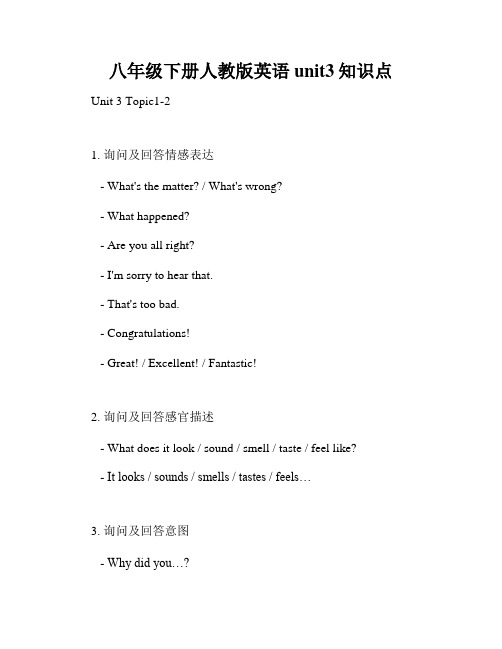
八年级下册人教版英语unit3知识点Unit 3 Topic1-21. 询问及回答情感表达- What's the matter? / What's wrong?- What happened?- Are you all right?- I'm sorry to hear that.- That's too bad.- Congratulations!- Great! / Excellent! / Fantastic!2. 询问及回答感官描述- What does it look / sound / smell / taste / feel like?- It looks / sounds / smells / tastes / feels…3. 询问及回答意图- Why did you…?- What are you going to …?- What do you intend to…?- I intend to… / I plan to…4. 问路及指路,口语表达中熟悉的方向词汇- Excuse me, could you tell me the way to…?- How can I get to…?- The nearest bus stop / subway station / bank / post office is… - It's on the left / right / opposite…Unit 3 Topic 3-41. 表达偏好及兴趣- Would you like…?- What kind of…do you like?- Do you prefer…to…?- I'm into…- I'm fond of…- I enjoy…2. 指出和辨认物品及人物(描述外貌和服装)- What does he / she look like?- He / She has…(描述头发颜色、眼睛、身材特征、穿戴等)3. 询问及描述活动安排- What are you going to do…?- What will you do…?- I'll…4. 描述天气- What's the weather like today?- It's sunny / cloudy / rainy / snowy / windy…- It's hot / warm / cool / cold…Unit 3 Topic 5-61. 表示和理解时间和星期- What time is it?- What's the date today?- What day is it today?- How many days are there in a week?- What do you usually do on weekends?2. 描述行程及活动- Tomorrow, I'm going to…(描述行程)- On Monday / Tuesday / Wednesday…, I usually… - In the morning / afternoon / evening / at night…, I…3. 询问及回答感受- How do you feel?- I feel…(描述感受)4. 描述位置- Where is the…? It's…(描述方位)以上是八年级下册人教版英语unit3的知识点总结,有效巩固这些知识点,可以让你在英语学习中更加得心应手。
Unit_3_知识点

11.besides adv.而且,况且,还有 prep.除...之外(还有) 易混辨析 besides,except,but,except for与except that/when 1)用亍否定句时,besides,except与but 可相互替换 No other students passed the maths exam except/besides/but Lin Tao and Wu Dong. 2)用于肯定句时的用法 a.besides表示"除了...以外,还包括..." Mr.Li knows three other languages besides English. b.except表示"除了...之外(不包括)" All of us went to the exhibition except Jack. c.but表示"除了...",与except意思相同。but常与不定代词连 用,如:something,anything,nothing,nobody,anybody,all等
即学即用 You had a party in Mary's.The party was____,wasn't it? C A funny B pleasure C fun D excited
13. it / one / that 易混辨析-1). 三者均可用作代词,指代前面提到的名词.一般说来,it指 代同名同物; one与that则指代同名异物。 I have lost my umbrella; I'm looking for it.(句中it就是指前 面的my umbrella) I have lost my umbrella; I think I must buy one.(one在句中表 泛指, 因为my umbrella已经丢了) The umbrella you bought is cheaper than that I bought. (替代词that在句中特指“the umbrella I bought”,以区别 “the umbrella you bought”)
人教版初中英语新教材七年级上Unit3知识点归纳总结(复习必背)

Unit 3 My school!学习目标单元主题人与自我→生活与学习→多彩、安全、有意义的学校生活必备单词Section A1.hall/hɔ:l/n.礼堂;大厅2.building/'bɪldɪŋ/n.建筑物;房子3. across/ə'krɒs/prep&adv.过;穿过4.gym/dʒm/n.(=gymnasium) 体育馆,健身房;(尤指学校的)体育活动5.field/fi:ld/n.场地;田地6.office/'ɒfɪs/n.办公室7.large/la:dʒ/adj.大的;大号的8.special/'speʃl/adj.特别的;特殊的9.smart/sma:t/adj.智能的;聪明的10.whiteboard/'waɪtbɔ:d/n.白板;白色书写板11.important/ɪm'pɔ:tnt/j.重要的12.notice/'nəutɪs/n.通知;注意v.注意到;意识到13.locker/'lɒkə(r)/n.有锁存物柜;寄物柜14.drawer/drɔ:(r)/n.抽屉15.corner/'kɔ:nə(r)/n.角;墙角;街角16.bookcase /'bʊkkeɪs/n.书架;书柜17.screen/skri:n/n.屏幕;银幕1.modern/'mɒdn/adj.现代的;当代的2.amazing /ə'meɪzɪŋ/adj.令人惊奇(惊喜或惊叹)的3.raise/reɪz/v.使升高;提高4.flag/flæg/n.旗;旗帜5.most/məust/adj.&pron.大多数;最多;最大adv.最6.change /tʃeɪndʒ/v.&n.改变;变化Section B 7.seat/si:t/n.座位8.delicious/dɪ'lɪʃəs/adj.美味的;可口的9.yours/jɔ:z/pron.(通常写作Yours,用于书信结尾的签名前)你的;10.send/send/v.发送;邮寄11.similar/'sımələ(r)/adj.类似的;相像的12.sound/saund/v.听起来;好像n.声音;响声高频短语1.dining hall 餐厅10.at school在学校2.in front of在······前面11.different from与······不一样3.next to 紧邻;在······近旁12.do exercises做体操4.across from在对面13.change seats 换座位5.sports field运动场14.similar to类似的;相像的6.put up张贴;搭建15.sounds fun 听起来有趣7.desk drawer 书桌抽屉16.tell sb about sth 告诉某人关于某事8.at the back(of)在(······)后面17.bye for now再见9.reading corner 阅读角18.most of...···的大多数/大部分常考句型1.表示“问路”与“指路”的句型:-Where's the dining hall?餐厅在哪里?-It's in front of the art building.它在艺术大楼的前面。
(完整版)英语必修三unit3知识点总结
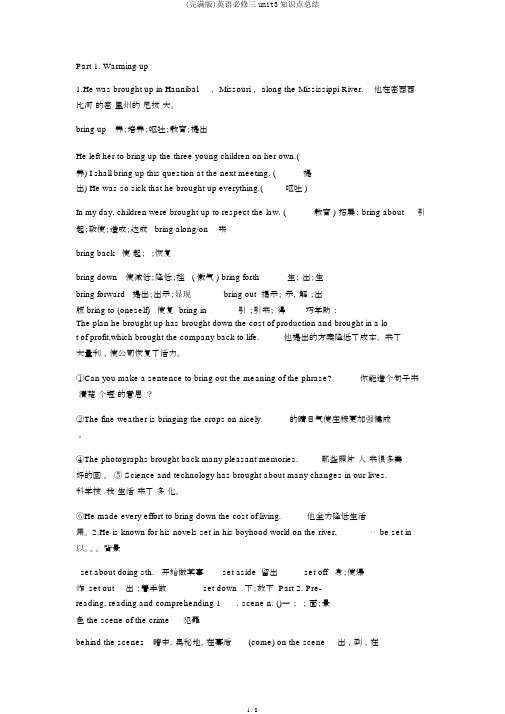
Part 1. Warming up1.He was brought up in Hannibal,Missouri,along the Mississippi River.他在密西西比河的密里州的尼拔大。
bring up养;培养;呕吐;教育;提出He left her to bring up the three young children on her own.(养) I shall bring up this question at the next meeting. (提出) He was so sick that he brought up everything.(呕吐 )In my day, children were brought up to respect the law. (教育 ) 拓展: bring about引起;致使;造成;达成 bring along/on 来bring back使起;;恢复bring down使减低;降低;挫 ( 傲气 ) bring forth生;出;生bring forward 提出;出示;显现bring out 揭示;示,解;出版 bring to (oneself) 使复 bring in引;引来;得巧学助:The plan he brought up has brought down the cost of production and brought in a lot of profit,which brought the company back to life.他提出的方案降低了成本,来了大量利,使公司恢复了活力。
①Can you make a sentence to bring out the meaning of the phrase?你能造个句子来清楚个短的意思?②The fine weather is bringing the crops on nicely.的晴日气使庄稼更加强健成。
Unit 3 知识点与练习
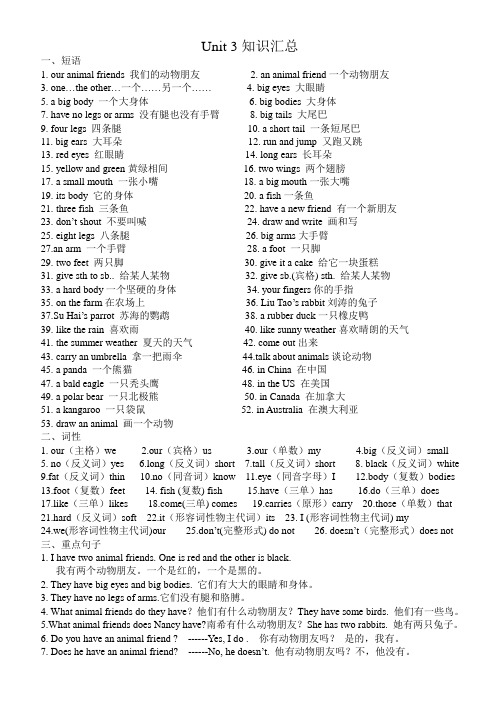
Unit 3知识汇总一、短语1. our animal friends 我们的动物朋友2. an animal friend一个动物朋友3. one…the other…一个……另一个……4. big eyes 大眼睛5. a big body 一个大身体6. big bodies 大身体7. have no legs or arms 没有腿也没有手臂8. big tails 大尾巴9. four legs 四条腿10. a short tail 一条短尾巴11. big ears 大耳朵12. run and jump 又跑又跳13. red eyes 红眼睛14. long ears 长耳朵15. yellow and green黄绿相间16. two wings 两个翅膀17. a small mouth 一张小嘴18. a big mouth一张大嘴19. its body 它的身体20. a fish一条鱼21. three fish 三条鱼22. have a new friend 有一个新朋友23. don’t shout 不要叫喊24.draw and write 画和写25. eight legs 八条腿26. big arms大手臂27.an arm 一个手臂28. a foot 一只脚29. two feet 两只脚30. give it a cake 给它一块蛋糕31. give sth to sb.. 给某人某物32. give sb.(宾格) sth. 给某人某物33. a hard body一个坚硬的身体34. your fingers你的手指35. on the farm在农场上36. Liu Tao’s rabbit刘涛的兔子37.Su Hai’s parrot 苏海的鹦鹉38. a rubber duck一只橡皮鸭39. like the rain 喜欢雨40. like sunny weather喜欢晴朗的天气41. the summer weather 夏天的天气42. come out出来43. carry an umbrella 拿一把雨伞44.talk about animals谈论动物45. a panda 一个熊猫46. in China 在中国47. a bald eagle 一只秃头鹰48. in the US 在美国49. a polar bear 一只北极熊50. in Canada 在加拿大51. a kangaroo 一只袋鼠52. in Australia 在澳大利亚53. draw an animal 画一个动物二、词性1. our(主格)we2.our(宾格)us3.our(单数)my4.big(反义词)small5. no(反义词)yes6.long(反义词)short7.tall(反义词)short8. black(反义词)white9.fat(反义词)thin 10.no(同音词)know 11.eye(同音字母)I 12.body(复数)bodies 13.foot(复数)feet 14. fish (复数) fish 15.have(三单)has 16.do(三单)does 17.like(三单)likes e(三单) comes 19.carries(原形)carry 20.those(单数)that 21.hard(反义词)soft 22.it(形容词性物主代词)its 23. I (形容词性物主代词) my24.we(形容词性物主代词)our 25.don’t(完整形式) do not 26. doesn’t(完整形式)does not三、重点句子1. I have two animal friends. One is red and the other is black.我有两个动物朋友。
人教版九年级英语unit3知识点

人教版九年级英语unit3知识点人教版九年级英语unit3知识1单词restroom [?restru:m] n.(美)洗手间;公共厕所stamp [st?mp] n. 邮票;印章bookstore [?bukst?:(r)] n. 书店beside[b??sa?d] prep. 在……旁边;在……附近postcard [?p?ustka:(r)d] n. 明信片pardon [?pa:(r)dn] v. 原谅 interj.请再说一遍washroom [?w??ru:m] n. 洗手间;厕所bathroom [?bɑ:θru:m] n. 浴室;洗手间normally ['n?:rm?li] adv.通常;正常情况下rush [r??] v. & n. 仓促;急促suggest [s??d?est] v. 建议;提议pass by 路过;经过staff [sta:f] n. 管理人员;职工grape [greip] n. 葡萄central [?sentr?l] adj. 中心的;中央的Nearby [?n?r?ba?] adj.附近的;邻近的 adv.在附近;附近Pardon me 抱歉, 对不起;什么,请再说一遍mail [meil] v. 邮寄;发电子邮件 n. 邮件east [i:st] adj. 东方的;东部的adv.向东;n.东方fascinating [?f?sineiti?] adj.迷人的;有吸引力的.Inexpensive[??n?k?spens?v] adj.不昂贵的Uncrowded [?n?kra?d?d] adj.不拥挤的;人少的convenient [k?n?vi:ni?nt] adj. 便利的;方便的mall [m?:l] n. 商场;购物中心clerk [kla:k][kl:rk] n. 职员corner [?k?:(r)n?(r)] n. 拐角;角落politely [p??laitli] adv. 礼貌地;客气地request [ri?kwest] n. 要求;请求direction [di?rek?n] [dai?rek?n] n. 方向;方位correct [k??rekt] adj. 正确的;恰当的polite [p??lait] adj. 有礼貌的;客气的 .direct [di?rekt, dai?rekt] adj. 直接的;直率的.speaker [?spi:k?] n.讲(某种语言)的人;发言者 whom [hu:m] pron. 谁;什么人impolite [??mp??la?t] adj. 不礼貌的;粗鲁的address [??dres], [??dres] n.住址;地址;通讯处.Underground [??nd?ɡra?nd] adj.地下的;n.地铁Parking lot n.停车场course [k?:(r)s] n. 课程;学科Italian [I?t?li ?n] adj.意大利\人的;n.意大利人\语Tim [tim] 蒂姆(男名)人教版九年级英语unit3知识2知识梳理重点短语1.a pair of 一对,一双,一副2.between A and B 在a和b之间3.on one’s / the way to 在去……的路上4.pardon me 什么,请再说一遍5.pass by 路过经过6.look forward to 盼望期待7.excuse me 打扰了请原谅8.get some information about 获取有关……的一些信息9.turn left\right 向左\向右转10.go past 经过路过11.a little earlier 早一点儿12.a good place to eat 一个吃饭的好地方13.in different situation 在不同的情况下14.on time 准时按时15.get to 到达16.have dinner 吃晚餐17.on one’s / \the right在右边e on 快点请过来19.the shopping center 购物中心20.the corner of....... 的角落/拐角处21.lead into 导入,引入重点句型1.问路常用的句子:①Do you know where is … ?②Can you tell me how can I get to …?③Could you tell me how to get to …?④Could/Will/Would you please tell me sth. 表示十分客气地询问事情Could you tell me how to get to the park?请你告诉我怎么才能去邮局好吗?2. decide to do 决定做…...She decided to go to have lunch. 她决定去吃午餐。
- 1、下载文档前请自行甄别文档内容的完整性,平台不提供额外的编辑、内容补充、找答案等附加服务。
- 2、"仅部分预览"的文档,不可在线预览部分如存在完整性等问题,可反馈申请退款(可完整预览的文档不适用该条件!)。
- 3、如文档侵犯您的权益,请联系客服反馈,我们会尽快为您处理(人工客服工作时间:9:00-18:30)。
Unit3知识点一、单词1._________部分,2. _______ 感觉,情感;3. _______照相机4._______嗅,闻起;5. ______手指;6. __________运动员7. ______家庭作业;8. _______问题;9._________病的;生病的10._______微笑;11. _______意思是 12. ________小量;少量13._______靠着,倚着;反对,违反 14._______尾部;尾巴15._______在......上面 15. ________地面 16. _________痛的17. ________足够的 18. ________笑 19. _______胃痛21. ________更好的 22. ______头痛 23. ________药24.________停留;留下 25. ________休息 26.______不同的27. _______逗人喜爱的;漂亮的 28. ________十二29. _________十三 30. ________有趣的;可笑的31. _______几乎;差不多二、短语1、play with 和......一起玩2、do one’s homework 做家庭作业3、What’s wrong 怎么了4、see red 火冒三丈5、listen to 听6、wave one’s hand 挥手7、stand against/upon 靠着......站8、see a doctor 看医生9、take the medicine 吃药10、have a headache/stomachache 头/胃痛11、stay home 待在家里12、have a good rest 好好休息13、look different/the same 看起来不同/相同三、知识点讲解1询问对方的感受用How do you feel?回答时用I’m/I feel+表示感情或感觉的形容词.如:-----How do you feel? 你感觉怎么样?------I’m/I feel happy/sad/cold/hot/tired/cool/warm.我(感到)很高兴/难过/冷/热/累/凉爽/暖和.2.询问人的高度用How tall,回答时用“数字 + metre(s) + tall”,也可以用I don’t know如:How tall are you? I’m 1.3 metres tall.3.询问人或物品的情况用What’s the matter?=What’s the matter? 还可说成What’s the matter with…?=What’s the matter with......?其答语并不固定,如:What’s the matter with your finger? I cut it. It hurts.4.want to do sth.=would like to do sth. 想要做某事want sb. to do sth. 想让某人做某事5.enough 作形容词的时候修饰名词,放在名词的前面后面都可以。
如:enough money 足够的钱,enough time 足够的时间。
作副词的时候修饰形容词或者副词,放在形容词或副词的后面。
如:big enough 足够大;short enough 足够小。
6. a bit “有点儿,稍微”修饰形容词或副词及其比较级,常放在修饰词前面,作程度状语。
修饰不可数名词的时候要加of 如;a bit of money .7.make sb. do sth. 是某人做某事;make sb./sth. +形容词使某/某物......8.had better do sth.最好做某事,否定句:had better not do sth. 最好不做某事9.Let’s do sth /let sb. do sth. 让我们做某事10.have fun =have a good time 玩得高兴;过得愉快have fun doing sth. 做某事很愉快11.What does he/she look like ? 某人长什么样?用来询问某人的长相。
回答是用主语+ be +形容词或主语+ have/has +形容词+名词如:--What does Jenny look like ? ---She is very tall. ---What does Tow look like? ----He has two big eyes.12.Are you OK? 常用于口语中,是询问别人身体好坏的问候语。
对其肯定回答常用“Yes, I’m Ok.Thanks.(是的,我很好,谢谢。
) ”,否定回答常用“No,I feel sick.(不,我不舒服。
)”13.What do/does ...mean? ......是什么意思? What does “panda”mean? Panda是什么意思。
What’s the meaning of...? ......是什么意思?What’s the meaning of this word? 这个单词是什么意思?四、实义动词have的用法1.一般来说,主语是第三人称单数时,谓语动词have用has的形式;主语是其他人称时用have.I have an elder brother. 我有一个哥哥。
He has two name. 他有两个名字.2.变一般疑问句是,通常借助于助动词do/does.主语是第三人称单数时用does. has还原成have;其他人称用do,即Do/Does+主语+have+...?Do you have brother? 你有兄弟吗?Does she have any pencils? 她有铅笔吗?3.变否定句时,一般在have前加don’t, 在has前加doesn’t,此时has还原为have,即主语+don’t/doesn’t have +...She doesn’t have any pencils. 她没有铅笔。
They don’t have children. 他们没有孩子。
4.口诀:动词have表示“有”,位置就在主语后。
“三单”主语用has,其它人称用have.一般疑问也简单,句首就把do/does添。
否定句子也一样,don’t/doesn’t主语后面放。
五、名词的复数形式1.名词复数的构成构成方法例词一般在词尾加-s book--booksmap---mapsbag--bags以s,x,sh,ch结尾的词加-es bus--busesbox--boxespeach--peaches以辅音字母加-y结尾的词,变y为i,再加-es. baby--babiesfamily--families 有些以f或fe结尾的词,变f或fe为-ves wife--wives2.单数与复数同形的名词sheep (绵羊),fish (鱼),deer(鹿),Chinese(中国人),Japanese(日本人) 3.不规则名词的复数:有的名词单数变复数是没有一定的规则。
man--men ; woman--women; child--children;tooth--teeth;foot--feet;mouse--mice老鼠注意:一些以man,woman结尾的合成词,构成复数时与man,woman的变化形式相同。
policeman--policemenEnglishwoman--Englishwomen4.有些名词只有复数形式。
clothes 衣服;glass 眼镜;scissors 剪子;pants 裤子;trousers裤子等。
语法专练:1.I _______ big eyes.A.haveB. hasC. amD. not have2.They _____ five white hairs.A.haveB. hasC. amD.doesn’t3.My friend ______ big ears.A.areB. hsC. hasD.have4.---How many _____ does a dog have?---Sorry,I have no idea. Let’s search on the Internet.A.toothB. teethC. toothsD. Teeths5.There are two _____ and three ______on the table.A.apple;bananaB.apples;bananaC. Apples;bananasD. Apple;bananas二、用have的正确形式填空1.My sister _______ a new coat.2.Wang Ling and I often ______ lunch at school.3.Mary and Lucy ______ a good teacher.4.Jenny _______ breakfast at 7:00 every morning.5.My classmate,Kate,______ blue eyes.6.Does Jenny ______ long hair?7._______ your mother a new hat?8.Li Jun _______ a stomachache.9.Wang Hong, do you ______ a new pencil?10.Li Ming _______ a headache.三、用括号中所给单词的适当形式填空。
1.I have two ______ .(elbow)2.His ______ are too big.(foot)3.How many ______ (play) does this team have?4.We see with our ______.(eye)5.Jenny’s _______ are too small.(ear)四、按要求进行巨型转换,没空一词。
1.They feel cold now.(对划线部分提问)______ _______ they feel now?2.His head hurts. (改为同义句)_______ _________ a headache.3.I have a stomachache.(改为否定句)I ________ ________ a stomachache.4.These are erasers. (改为单数形式)________ ________ _______ eraser.5.What’s wrong with her ?(改为同义句)What’s ________ ________ with her?6.Do you feel good?(作肯定回答)_________, I ___________.7.He is sad today. (改为否定句)He _______ ______ today.。
